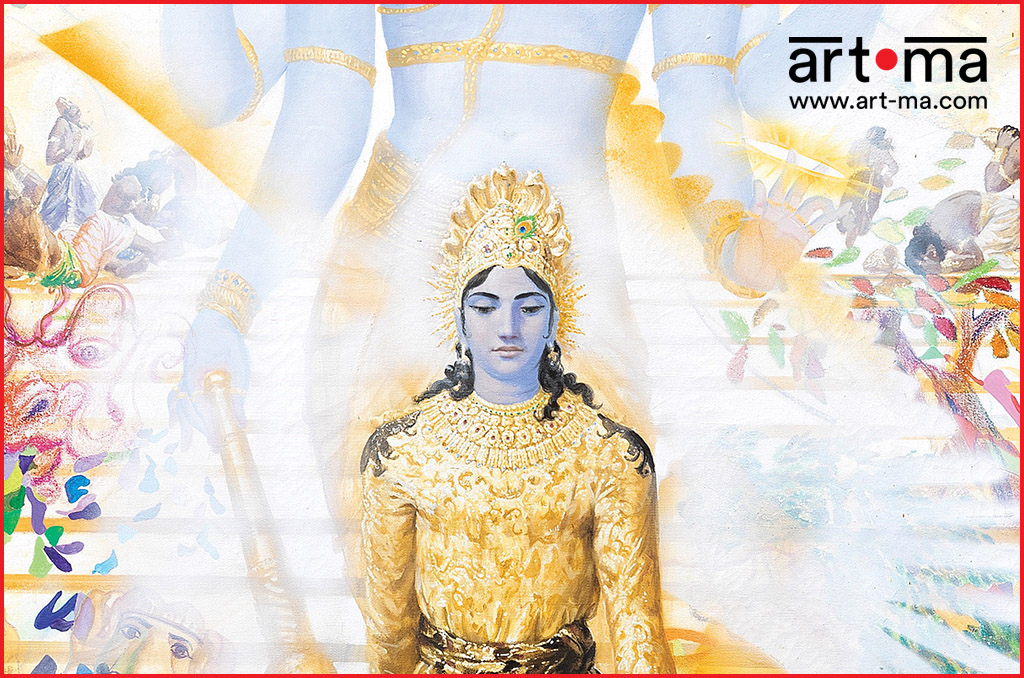Friend, philosopher, guide – these three words explain the role that Lord Krishna plays in the Mahabharata. Krishna, who is an avatar of Vishnu, is the God of compassion and love. Krishna’s early life has been well documented in another literary masterpiece called the Srimad Bhagavatam also written by Vyaasa. It gives us a complete insight into Krishna’s personal life, but doesn’t say anything about his public life. Vyaasa elaborates on this aspect of Krishna’s life in the Mahabharata, where we see him on a mission to rid the world of evil.
Vyaasa wrote the character of Krishna with the sole aim of depicting a life of perfect unselfishness – which means Krishna always carried out actions that helped others but never helped him in any way. In the Mahabharata, Krishna is almost omnipresent, making his presence felt at the most crucial moments in the epic.
Krishna made his entry into the Mahabharata at a later stage – during Draupadi’s swayamvar. He was a silent spectator in Drupad’s court and he watched as kings and princes failed in the challenge set to marry Draupadi. He was still watching as Arjuna, dressed as a Brahmin, won the challenge and took his bride home, much to the chagrin of the royal spectators.
After Arjuna introduced Draupadi to his mother Kunti, Krishna arrived carrying expensive presents for the Pandavas. When Yudhishthira asked the reason for the costly gifts, Krishna replied saying because the glory of the Pandavas had been seen in the court of King Drupad. He was the only one sitting in the swayamvar who recognized that the Brahmins in Drupad’s court were in fact the Pandavas. This is just one example of Krishna’s ability to recognize greatness in the ordinary.
Krishna was a great friend, especially to the Pandavas in their time of need. When the Pandavas came back to Hastinapur after a period of exile, Duryodhana begrudgingly gave them a piece of dry land called Khandavprastha, with no water and infertile soil to rule over. It is with Krishna’s help that the Pandavas converted this land into a beautiful kingdom with a magnificent palace that outshone Duryodhana’s abode.
Krishna’s selflessness came to the fore once more when the Pandavas returned from their second exile of 13 years and a war between them and the Kauravas was now inevitable. Krishna tried to stop the war by going to Duryodhana’s court and asking him to settle his dispute with his cousin brothers amicably, but to no avail.
In the Kurukshetra war, we see Krishna transition from a friend to a philosopher and guide to the Pandavas. Krishna chose to be Arjuna’s charioteer over a more commanding position as he felt he could be more of a help in that role. This help can be seen from the get-go when Arjuna hesitated to fight against his kin at the start of the war. It is Krishna who helped Arjuna realise that duty comes before all else and that this battle was for the greater good. There are several mini-battles in the Kurukshetra war that Arjuna would have surely lost if it hadn’t been for Krishna’s protection.
An important example of this would be at the end of the war, after the Pandavas won and Krishna insisted Arjuna get down from the chariot first. Arjuna obeyed and got down. But as soon as Krishna got down and the flag of Hanuman flew away, the chariot burst into flames and was reduced to ash. A shocked Arjuna asked Krishna why this happened. Krishna replied saying the arrows of Drona and Karna had already burnt the chariot, but it remained intact because of Krishna’s presence. It burnt down as soon as he stepped out of it, which is why he insisted Arjuna step down first.
But even though he had a large part to play in the Pandavas winning the Kurukshetra war, Krishna remained humble even in victory. He congratulated Yudhishthira, and gave credit for the victory to the brothers, never once mentioning his role.
Krishna’s character is a lesson in true friendship and how valuable it can be in one’s life. He never once wavered in his loyalty to the Pandavas and guided them to victory. He gives us lessons in humility and that no job is too small or big. Krishna had such strength that he could have single-handedly won the Kurukshetra war. But he chose the role of a charioteer and guided them, proving no labour is without dignity. But most importantly, Krishna teaches us to always be of service to our fellow man, as this is the only way to contribute to the greater good.

